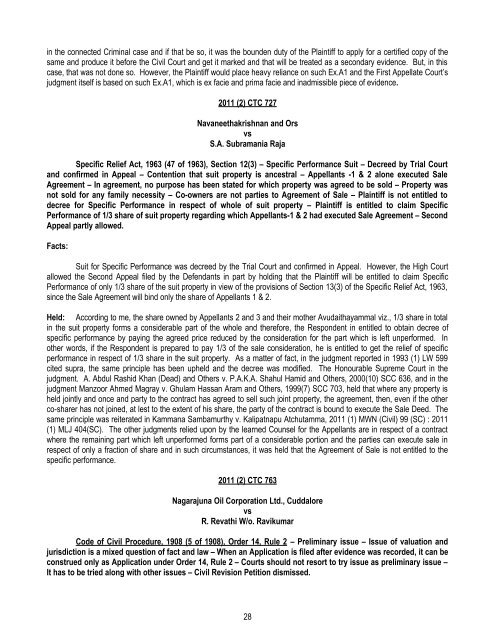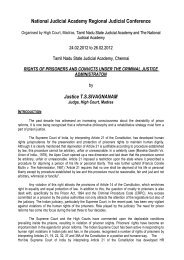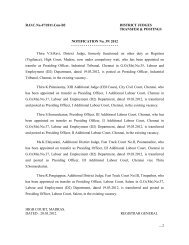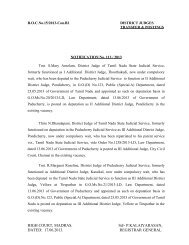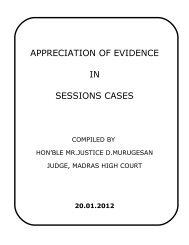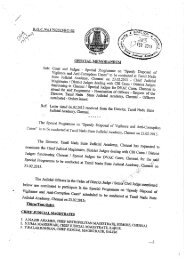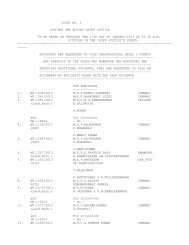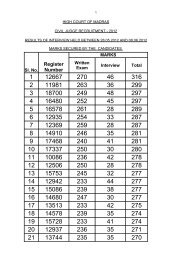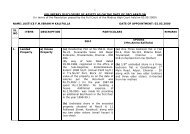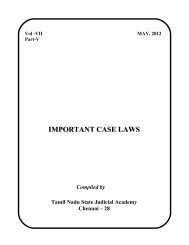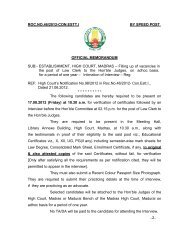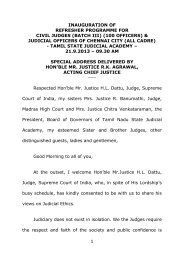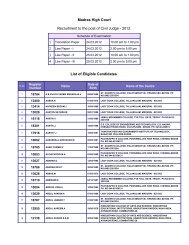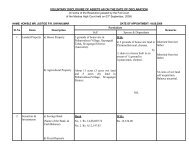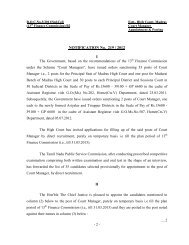IMPORTANT CASE LAWS - Madras High Court
IMPORTANT CASE LAWS - Madras High Court
IMPORTANT CASE LAWS - Madras High Court
Create successful ePaper yourself
Turn your PDF publications into a flip-book with our unique Google optimized e-Paper software.
in the connected Criminal case and if that be so, it was the bounden duty of the Plaintiff to apply for a certified copy of the<br />
same and produce it before the Civil <strong>Court</strong> and get it marked and that will be treated as a secondary evidence. But, in this<br />
case, that was not done so. However, the Plaintiff would place heavy reliance on such Ex.A1 and the First Appellate <strong>Court</strong>’s<br />
judgment itself is based on such Ex.A1, which is ex facie and prima facie and inadmissible piece of evidence.<br />
2011 (2) CTC 727<br />
Navaneethakrishnan and Ors<br />
vs<br />
S.A. Subramania Raja<br />
Specific Relief Act, 1963 (47 of 1963), Section 12(3) – Specific Performance Suit – Decreed by Trial <strong>Court</strong><br />
and confirmed in Appeal – Contention that suit property is ancestral – Appellants -1 & 2 alone executed Sale<br />
Agreement – In agreement, no purpose has been stated for which property was agreed to be sold – Property was<br />
not sold for any family necessity – Co-owners are not parties to Agreement of Sale – Plaintiff is not entitled to<br />
decree for Specific Performance in respect of whole of suit property – Plaintiff is entitled to claim Specific<br />
Performance of 1/3 share of suit property regarding which Appellants-1 & 2 had executed Sale Agreement – Second<br />
Appeal partly allowed.<br />
Facts:<br />
Suit for Specific Performance was decreed by the Trial <strong>Court</strong> and confirmed in Appeal. However, the <strong>High</strong> <strong>Court</strong><br />
allowed the Second Appeal filed by the Defendants in part by holding that the Plaintiff will be entitled to claim Specific<br />
Performance of only 1/3 share of the suit property in view of the provisions of Section 13(3) of the Specific Relief Act, 1963,<br />
since the Sale Agreement will bind only the share of Appellants 1 & 2.<br />
Held: According to me, the share owned by Appellants 2 and 3 and their mother Avudaithayammal viz., 1/3 share in total<br />
in the suit property forms a considerable part of the whole and therefore, the Respondent in entitled to obtain decree of<br />
specific performance by paying the agreed price reduced by the consideration for the part which is left unperformed. In<br />
other words, if the Respondent is prepared to pay 1/3 of the sale consideration, he is entitled to get the relief of specific<br />
performance in respect of 1/3 share in the suit property. As a matter of fact, in the judgment reported in 1993 (1) LW 599<br />
cited supra, the same principle has been upheld and the decree was modified. The Honourable Supreme <strong>Court</strong> in the<br />
judgment. A. Abdul Rashid Khan (Dead) and Others v. P.A.K.A. Shahul Hamid and Others, 2000(10) SCC 636, and in the<br />
judgment Manzoor Ahmed Magray v. Ghulam Hassan Aram and Others, 1999(7) SCC 703, held that where any property is<br />
held jointly and once and party to the contract has agreed to sell such joint property, the agreement, then, even if the other<br />
co-sharer has not joined, at lest to the extent of his share, the party of the contract is bound to execute the Sale Deed. The<br />
same principle was reiterated in Kammana Sambamurthy v. Kalipatnapu Atchutamma, 2011 (1) MWN (Civil) 99 (SC) : 2011<br />
(1) MLJ 404(SC). The other judgments relied upon by the learned Counsel for the Appellants are in respect of a contract<br />
where the remaining part which left unperformed forms part of a considerable portion and the parties can execute sale in<br />
respect of only a fraction of share and in such circumstances, it was held that the Agreement of Sale is not entitled to the<br />
specific performance.<br />
2011 (2) CTC 763<br />
Nagarajuna Oil Corporation Ltd., Cuddalore<br />
vs<br />
R. Revathi W/o. Ravikumar<br />
Code of Civil Procedure, 1908 (5 of 1908), Order 14, Rule 2 – Preliminary issue – Issue of valuation and<br />
jurisdiction is a mixed question of fact and law – When an Application is filed after evidence was recorded, it can be<br />
construed only as Application under Order 14, Rule 2 – <strong>Court</strong>s should not resort to try issue as preliminary issue –<br />
It has to be tried along with other issues – Civil Revision Petition dismissed.<br />
28


